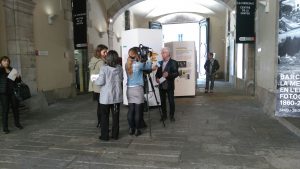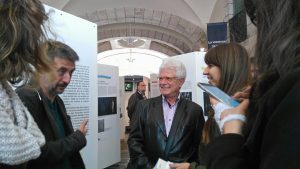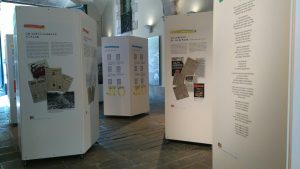- Start
- Programmes
- 1975. The “no to catalan” city councillors
1975. The “no to catalan” city councillors
Dates: 13/05/2016 - 26/06/2016
Venue: Palau de la Virreina courtyard
Since its beginnings, Catalan nationalism has always put language at the top of its demands. But it was the repressive fixation of the two dictatorships in the 20th century (especially Franco’s) that ended up turning it into it into a central demand, alongside political autonomy. Francoism practically eliminated the presence of the Catalan language from public spaces and attempted to undermine it in private spaces. By the same token, several individuals from inside the regime also attempted to reduce persecution from the beginning, considering it counter-productive: it was preferable to assimilate Catalan, they said, as a folkloric peculiarity, to avoid its becoming a tool of the opposition. Discussions on Catalan within the regime remained an unresolved issue that was unearthed from time to time to improve the dictatorship’s image. The revival of Catalan nationalism, which was fairly strong in the 1960s, eventually placed the matter at the centre of the debate. However, internal divisions prevented the regime, which was always more favourable to repression than tolerance, from acting consistently to root out the language. On 4 March 1975, a Full Barcelona City Council Meeting still rejected to provide a relatively modest grant for Catalan language classes, by eighteen votes to nine and seven abstentions. The citizen movement, with the Federation of Residents’ Associations playing a central role, reacted to the events as a genuine provocation and forced the Francoist authorities to fix Barcelona City Council. The brief history of the eighteen “no” councillors is a good example both of the inexperience of the Francoists (lost in the middle of ideological prejudices and internal squabbles), and of the importance that the opposition (enjoying a resonance with the majority of the population) gave language as an identifying element. Reclaiming the Catalan language therefore played a role that we would describe today as cross-cutting in the final struggle against the Francoist dictatorship.
The eighteen “NO to Catalan” City Councillors
Local resident mobilisations
After the General Education Act of 1970 was approved, allowing (and even recommending!) the protection and teaching of the Catalan language, official action on this matter came to nothing. Mobilising cultural and professional organisations had been important but discreet. It was the Barcelona Federation of Residents’ Associations (FAVB) that played the central role in attacking official policy, with its launch of the manifesto “We want Catalan and democratic city councils and schooling”, signed initially by 47 organisations and later by 118, which would bring together democracy and the Catalan language as an inseparable pair. Anti-Franco activists (mainly from the PSUC) secured collaboration, consent or at least resignation over the issue from members of the more docile neighbourhood councils and openly defied the government of Arias Navarro and, by extension, the regime.
Terms of rectification
Barcelona City Council took a U-turn in a record time of two months. Besides allocating money, it created three work commissions resonantly named the Commission for Catalan Language and Literature, the Commission for Catalan History and Art and the Commission for Catalan Traditions and Customs. They were presided over by the 3 deputy mayors and made up of a further 8 councillors: in all, 25 of the 35 members of the Full City Council, with those voting “no” in an absolute majority (14). The budget problem alleged by opponents to the Soler Padró amendment suddenly disappeared and furthermore, a comprehensive study plan was outlined. Nothing has transcended their work, which was paralleled at the Catalan Cultural Congress, during its initial stage. Once the budget had been approved, it was by no means clear what kind of work would be entrusted to commissions made up of businesspeople and trade unionists where only one of the Council’s three professors was included. A serious proposal would have automatically been transferred to the Commission for Culture and have eventually established a committee of ad hoc experts.
Manager of the project: Commissioner for Memory Programmes. Barcelona City Council, Organisation and production Department of Memory and History Barcelona Institute of Culture, curator Martí Marín Corbera
- Els regidors del NO al català
- Els regidors del NO al català
- Els regidors del NO al català




